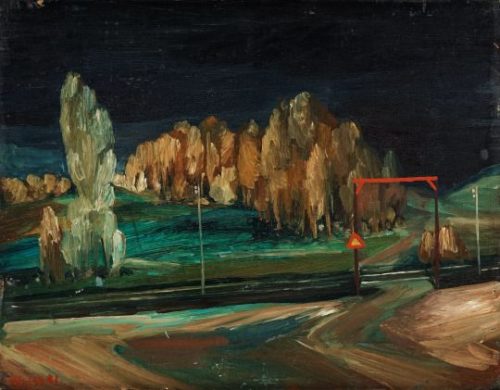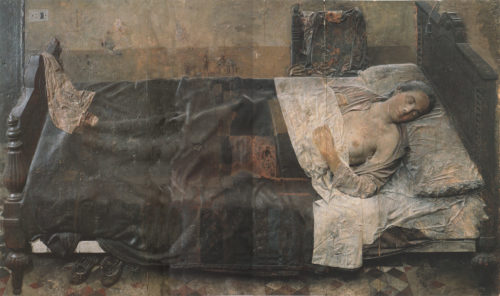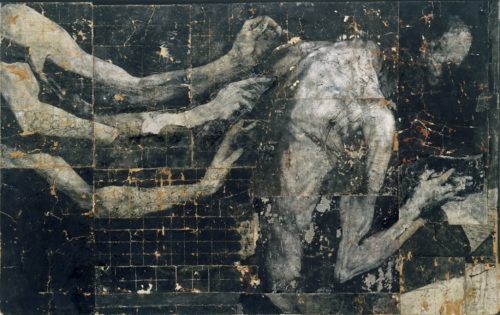
Giotto
“…Weiss writes of the meetings he must have with the dead, and his solidarity with those who already “only too obviously bear [their death] around with them, who are on the way to the ferryboat, to Acheron, who already hear Charon’s call and the plashing of his oars.” The process of writing which Weiss has recently planned, now that he is about to embark on his literary work Ästhetik des Widerstands (“Aesthetic of Resistance”), is the struggle against “the art of forgetting,” a struggle that is as much part of life as melancholy is of death, a struggle consisting in the constant transfer of recollection into written signs. Despite our fits of “absence” and “weakness,” writing is an attempt “to preserve our equilibrium among the living with all our dead within us, as we lament the dead and with our own death before our eyes,” in order to set memory to work, since it alone justifies survival in the shadow of a mountain of guilt.”
W.G. Sebald. “On the Natural History of Destruction.” (on the works of Peter Weiss)
“In other words, the issue was not recognizing the right of every nation to self-determination in the abstract. That was incontestable. The problem consisted in the fact that, in a concrete, determinate situation, because of the initiative and political skill of the imperial power, the right of some nations to self-determination could come into conflict with the right of other nations and with the movement struggling against the ‘ancien régime’ and absolutist monarchy, and for the realization of democracy at home and abroad. What is out of the question is the customary binary logic.”
Domenico Losurdo
“Perhaps the most disturbing further thought that results from this line of argument is that the real world of civilization which we inhabit is really already the world of de Sade—of universal sadism directed at self and others and of sadism’s mirror image, masochism—if just a bit less fully and systematically organized, a bit less fully “rational” than The 120 Days of Sodom.”
Raymond Geuss (Virtue and The Good Life).
The idea of aggression seems to me very important right now. Maybe that sounds almost naive or simpleminded, but I think it is not. And I think aggression is now being revealed in more clarity by the state of American society. But that ongoing process of reveal is also accompanied by various processes of concealment. Losurdo mentions a comment of Engels regarding events in 1849, and how Slav peoples were in the service of reaction, that Croats and Cossacks were “small intercalated states { } …have never had a history of their own”. And this made me think of Peter Weiss, of whom I have been thinking a lot recently and his ideas on memory and memorials.

Vilhelm Hammershoi
There is another discussion in Sebald’s book, in the chapter on Weiss, a remarkable chapter, really, that brings up Rembrandt’s painting of the anatomy class. Tad Spurgeon said…“But what is so unique about Rembrandt is the depth of moral gravity in his work…” This is a great comment, and a significant one today. The painting (The Anatomy Class of Dr. Tulp, 1632) is telling because none of the figures are looking at the corpse (save one, maybe). Sebald wrote…“Rembrandt’s picture of the dissection of a hanged body in the interests of higher ideals is an unsettling comment on the particular kind of knowledge to which we owe progress.” Worth noting that Rembrandt painted a second anatomy class study, meant to be displayed next to the earlier work, however it was damaged in a fire and only a central fragment remains. But what is is so compelling, if that’s the word, in Rembrandt, is always the color. The color is very tightly bound up with a limited palette that demands the viewer note the small distinctions between various shades of the same pigment. A quick internet search of these two paintings will reveal countless parodies, something that strikes me as not insignificant. Rembrandt is not really popular today. He is accepted as a part of the canon, but mostly he is avoided. The treatment of color is too demanding, perhaps, or too aggressive, or too schizophrenic. In any event, Weiss’s novel Aesthetic Resistence { Ästhetik des Widerstands} (a title I borrowed for my own book) remains a hugely neglected 20th century masterpiece.
Progress is, then, resolutely ambivalent. The expression of the surgeon in Rembrandt’s second anatomy painting resembles very much the expressions of those in the Nuremburg tribunal, and the later Frankfurt/Aushwitz trial, on which Weiss based his play The Investigation. Of course remembering was what the victims must do, not the perpetrators. Rembrandt’s first more famous painting of Dr. Tulp’s class, shows the body of a criminal, hanged that very day.

Peter Weiss
“… affirmation of the principle of self-determination does not necessarily entail support for the agitation of ‘small states’ or ‘nationalities’ { } …there are countless separatist movements instrumentally encouraged or supported by great powers which are protagonists of national oppression on a large scale. It may even turn out that recognizing a particular people’s self determination strengthens the main enemy of the liberation movement of oppressed peoples as a whole.”
Domenico Losurdo
There is a relationship here with both victim’s rights, and with progress, and aggression. And no doubt overall with memory.

Albert Renger-Patzsch, photography.
One of the ways concealment takes place in contemporary culture is through focusing on themes of individual struggles of identity, and with, always, layerings of the sentimental and/or the optimistic. The audience for screen narratives are besieged with images of cartoon violence. I’ve noticed how scenes of extreme punishment, brutal beatings, result (usually in the next scene often) in little more than few bruises and a band aid. The audience is again and again spared the real consequences of violence. Conversely the problems of identity result, usually, in enormous outpourings of emotion and a demand for sympathy.
“He (Rembrandt) grew old in a climate of economic fanaticism and indifference—not dissimilar to the climate of the period we are living through. The human could no longer simply be copied (as in the Renaissance), the human was no longer self-evident: it had to be found in the darkness.”
John Berger

Camp guard Wilhelm Borger, 2nd Frankfurt Auschwitz Trial, 1965/66
In a sense, the prestige arts today are in the service of denying darkness. I know of a very high end regional theatre that has a young playwright developing {sic} his new play by having actors read scenes and then asking them for advice on lines of dialogue and the direction the play should take. This is all seen as quite reasonable. But back to aggression…
“The death of the other man he had no objection to; it meant the annihilation of a creature hated, and primitive man had no scruples against bringing it about. He was in truth, a very violent being, more cruel and more malign than other animals. He liked to kill and killed as a matter of course. That instinct which is said to restrain the other animals from killing and devouring their own species we need not attribute to him.”
Freud (Thoughts of War and Death, 1915)
One of the factors in this mass obscuring of darkness, which needs to be better defined, is that it coincides with a momentum that came out of colonial projects — meaning the civilizing mission of European colonialism, and then U.S. Manifest Destiny; a momentum that even Marx and Engels subscribed to, at least to a degree. For this is how deep runs the belief in progress. And progress cannot be separated from the foundational aggression of modern men and women. The U.S. today is the inheritor of a mutilated language of aggression. At least the white population of the U.S. I find this no place else, interestingly. It is a language of confrontation, of ridicule, and of overriding hostility. Even the most simple exchanges teeter precariously and risk falling into attack mode at any moment. There was a recent mini controversy (and it wasn’t even that) around a short blog post by Australian Caitlin Johnstone. Now this isn’t about Johnstone…or her ideas, which mostly I disagreed with in this case. But the post in question was a sort of thinking out loud thought experiment. And even if it wasn’t, the point is that I read…just me…six different attacks on Johnstone, and all by white men. All by University educated white men. Now, this strikes me as rhetorical inflation at the least. Would these attacks have occurred if Johnstone had been a University educated white man? That is the question. Again, this wasn’t to say some of the attacks were not correct. Or, at least not irrationally wrong. But the tendency is to pile on. This happens in daily discourse constantly. And then one finds the bourgeois feminist reaction which entails a concepts like *mansplaining*, which itself is an appropriation of genuine resistance. A trivialization. Misogyny is made cute, suitable for simple minded memes. But it’s also not that simple. The forces of reaction in the U.S. (and the mini controversy I allude to was in leftist rags, one of which I write for from time to time and which I respect) employ a syntax and tone of aggression. But, also, alternatively, can take on an adopted grammar of fake politeness. It is the sound of old time conservatives. The language of rich old white men. The language that mimics Sunday school manners and gentlemens clubs from the Raj. And this is the language one sees or hears reproduced in Hollywood product all the time, especially in characters who are either cops or soldiers. The exaggerated and almost parodic mimicking of reactionary social customs. The marketing of rituals of obedience.

Michael Zavros
I bring all of this up because aggression in the U.S. is sanctified by not only formal laws, however selectively applied, but enhanced and intensified, if not created by, an inheritance of colonial/settler rhetoric. Even the educated bourgeoisie in the U.S. speak a language of aggression. It is the only language available. It is a language full of empty fillers, or framers, or what is called *cajolers*. This includes *openers*…Come on, Wait a second, do you really think, you know, kind of, sort of, er, uhm, seriously, etc. The list is nearly endless. And in spoken language far more than written language, the use of these fills takes on the tone of snideness. And there is a gendered aspect, of course. The emphatic stress is the domain of the less powerful in direct conversation. Adjectives are given exaggerated stress. (that was BRILLIANT). There is also the falling intonation of questions, if they come from women. The point is that American English is now increasingly modulated with codes or cues for a deeply inflexible social hierarchy. And subaltern groups form their own set of rhetorical prostrations. All of it, however, bows before the aggression of white male language.
“It tears up all bonds of community among the warring peoples and threatens to leave behind an embitterment that will make any renewal of these bonds impossible for many years to come.”
Freud (Thoughts of War and Death, 1915)
Here ambivalence enters the discussion, again. For Freud, ambivalence is in the tension between drive and self — however that is arrived at. As Samuel Weber put it, ‘is it the drive or is the person’. Is it me? I would argue that contemporary society is more ambivalent than any in history. And one expression of that ambivalence is in the particular way that emotional content is presented in popular culture (and the particular way that violence is obscured or mystified).

Antonio Lopez Garcia
“To think of one’s own death as one normally thinks of other things, namely, by representing it, is to transform it into a spectacle and ourselves into spectators and thereby to miss what distinguishes it from all other worldly events and phenomena: the cessation of our being in the world. To represent one’s own death is thus necessarily to misrepresent it.”
Samuel Weber
This leads into a related area, which is the nature of hierarchy in contemporary society, and the manner of how such hierarchies are created. And education is certainly a very significant part of this. Or, rather, educational certification. Pierre Bourdieu points out the comparison in fields of study that are seen as bastions of gifted and inherited cultural capital (philosophy, math, languages) and those that are ranked by effort (natural sciences, geography, history). Now these fields, or ranks of discipline, change over time. And Bourdieu was writing of France and not the U.S. But it is clear that a willingness to work hard is anathema to the ruling class. Working hard is, well, work. It is then not surprising when reflecting on post war French culture to see the philosophy departments taking on a quality of reaction, and fields requiring more actual work trending toward the radical. For even philosophers of radicalism have tended to harbor reactionary qualities. But here it is important to examine how class is perceived and manifested in the U.S. in comparison with France. The consecrated program for study in the U.S. is law, or business. There is no inherited cultural capital associated with mathematics for example. Bourdieu makes an interesting and perceptive observation (regarding French society) on the valorizing of *precocity*. There is less attention to this in the U.S., though perhaps it only finds expression in other ways. The cult of youth has been monetized in the U.S., and without the historical underpinnings of aristocratic history, the American system pays far less attention to precocity per se. The French ideal of precocity dates back to the 16th century, in fact. In the U.S. the closest one gets is the admission policy regarding legacy applicants. George Bush Jr was such a case, for example. But this is also, simply, the fact that class again mediates everything.

Sun Yanchu, photography.
Now Freud thought that prehistoric man came to some notion of the soul through watching the disintegration of a corpse. Whether true or not (I think not) the advent of electronic media, and of film and TV has changed this notion of spectatorship.
“This ghostly, spectral life—or at least one aspect of it—is precisely what the electronic media contribute to the institutionalization of death as spectator sport. If technology in general has always been defined as a kind of prosthesis, a substitute for the finitude and deficiencies of the body, commercial broadcast television, vending viewers, as virtual consumers, to advertisers for profit, carries this relation to a qualitatively new stage. Television suspends the attachment of visual and auditory perception—the power to see and to hear—to individual bodily organs, which is to say, to living, mortal beings located in a particular place at a particular time.”
Samuel Weber
And electronic and digital media has now begun to both serve as the new bio-police (in the form of surveillance) and of something that suggests contradiction. And that is the anxiety of mass culture today. The constant non stop repetition of the same stories, the same over and over and over, has meant the collective psyche of this priest class from Hollywood is caught in an exhaustion of the imagination. I have seen the same character names in two shows on the air at the same time, but unrelated (Elizabeth Keen is a central character on Homeland, and a central character name on Blacklist). I have seen secret organizations with the same name (ATLAS in this case) on two shows, and the same lines of dialogue repeated four or five times in different shows. Its unconscious plagiarism of a sort, but more its just unconscious period. So numb and empty are the creative minds at work in mass culture that nobody even notices this stuff.
Now, thinking on the rise of National Socialism, and on Auschwitz, on the final solution, it is clear that one could find many levels of barbarism and sadism throughout history. The conquest of the New World (sic) was its equal, but for various reasons the Nazi epoch carried some additional metaphoric significance. And Enzo Traverso touched on this, I think.

Peter Weiss
“While the convergence of counterrevolutionary feeling and anti-Semitism may have forged a new category, “Jewish Bolshevism”, that became a peculiarity of the National Socialist
ideology, the definition of the class enemy in terms of race, the vision of political revolt as expressing a sickness in the social body, and the stigmatization of the revolutionary as a carrier of contagious virus were phenomena that dated from much earlier. A telling example is provided by France at the beginning of the Third Republic, with its mixture of positivism, scientism, racism, and conservatism, radicalized by the memory of the political uprisings of 1848 and 1871. The almost parallel rise between 1860 and 1890 of new disciplines such as microbiology (Louis Pasteur), experimental medicine (Claude Bernard), anthropology (Paul Broca, Paul Topinard), eugenics and racial anthropology (Georges Vacher de Lapouge), criminal anthropology (Lacassagne), neurology (Jean-Martin Charcot), crowd psychology (Gustave Le Bon, Tarde), and sociology (Emile Durkheim) created conditions that favored an amalgamation of science and politics that then found expression in a biological approach to social behavior and in a kind of medicalization ofthe strategies of power.”

Rembrandt (Portrait Of A Bearded Man In A Wide-Brimmed Hat, detail).
The Nazi’s were expressing a kind of final chapter for progress. Not all progress led to National Socialism, certainly, but it wasn’t exactly a mutation either. And this period, the start of the second half of the 19th century, saw the racialization of class. In other words, the social body needed prescriptive assistance, and this primarily in the form of protection from the infirmity of the lower classes. And in particular the racial inferiors from outside white Europe. The colonial people were from a projected past. The state became, as Traverso put it, a bio-power. The segregation of classes, in particular the lower classes and racial inferiors, were to be kept separate and controlled. This marked the bureaucratization of social biologism. And this idea was linked with metaphoric suggestions of collective ancestral barbarism. Communists, the Jewish menace, was in particular an example of born criminality, but also of contagion. The idea of contagion was a particularly powerful image for France at this time. The savages of the colonial world were carriers of disease, both physical and moral. The class enemy, as Traverso puts it, was not a political enemy but a biological one, animalistic and primitive.
This also saw the origins of the scientific study of racial weaknesses, among them alcoholism and drug addiction. It was the topic of numerous newspaper articles, where the lower classes were described as in the grasp of a fever or sickness, but one of character and linked with an inherent tendency to poor hygiene. Hippolyte Taine wrote in The Origins of Contemporary France (1878)…
“Disease: the Jacobins had “sick minds” and Marat was “mad”; the insurgents were inflamed by a contagious virus, like people who become feverish from “contact with those suffering from fever.” The Virus that had first made its appearance in 1789 had been transmitted from one generation to the next, right down to the epidemic of 1871.”

Mima Ogasawara
Italian positivists focused on criminality as an expression of a biological lack of progress. The criminal was one left behind on the march forward. As Lombroso put it, “criminal atavism”— the return of barbaric tendencies due to cross breeding among races. The cost of colonial exploration. This was the era of the Bertillon archives, the registry for criminals and anarchists. An entire system of almost Philip Dickian pre crime beliefs arose to help cleanse the body politic. The relevance here is that progress, rationality, and the offspring of this; classifications and monitoring all operated as signs of enlightened public policy. The looming terror was that of the past. An imagined dark (!) historical past that was always threatening to return, a return that would swallow the advanced societies of the West. The images were repetitive and always suggested something ultimately unknown, lurking in the shadows of collective memory.
Today these tropes are mediated by a weird mutative populism. It is not what Losurdo describes in his critique of Simone Weil (one that I find not completely convincing, but still worth discussion) where it is not the modern factory or machines in them, but Capitalist utilization of them. Which is true, though Im not sure exactly the nature of the contemporary factory — and even so, it is only a stage, and a necessary one, but eventually the machine must be discussed as an element in the alienation of man. Anyway, I digress slightly. The weird populism I mention is the way in which mass culture now informs those who manufacture it. Even the corridors of the Pentagon traffic in the metaphors and lessons from Game of Thrones. And not just that; they have internalized these narratives the way people internalized the oral stories from traveling poets. And those making Game of Thrones, or whatever, Breaking Bad or The Sopranos are themselves agents of even other internalizations (hence the unconscious plagiarism).

Police mugshots, North Shields, England 1880s.
The modern notion of addiction contains the residue of this. Racial or biological weakness migrated into moral weakness, but moral weakness was only a cover for biological today. Addiction is an *illness*. Only the weak, inferiors, get sick in this way. Twelve Step programs recuperate and rehabilitate this idea. One must testify to one’s own helplessness and weakness, and then be supervised and this ritual of submission is repeated over and over and over because you are never cured, you are never not weak and helpless.
Worth noting, and Traverso delves into this in his great Origins of Nazi Violence, that eugenics — which came out of this same late 19th century cauldron of scientific rationalism, was first implemented by the U.S. and later Scandinavia and Switzerland. Forced sterilization was carried out for *inferiors* in California, Kansas, and Wisconsin. Later also in Iowa, Nevada, and Washington.
“In 1911, on the eve of World War I, the British military specialist Sir Reginald Clare Hart set out an ambitious biological theory of warfare according to which, in opposition to the naive pacifism’ofComte and Spencer, he saw in war an instrument of progress and an essential opportunity for the regeneration of humanity that was indispensable for the reestablishment of a demographic equilibrium between nations. In his conclusion, Hart pleaded for “an implacable war for the extermination of the beings of inferior nations.”
Enzo Traverso

Cairo, 1880s. Photographer unkown.
Social critic Jacques Novicow, a Frenchman, advocated what he called ‘collective homicide’ as the enlightened strategy for ensuring the progress of humankind. And really, all forms of institutional punishment recreate the fears of this shadowy historical memory of barbarism. Except this fear is hugely mediated with fairy tale mythology related to hysteria. Mussolini advocated *Spiritualist Romaness*, and Germany and Hitler preferred Ayran Supremacy. The etiology was the same; an atavistic contagion was creeping up to the *borders* of respectable European civilzation.
“Hitler did not invent much…”
Andre Pichot
A brief side bar here. One of the most popular tropes today, embraced by huge swaths of the green movement, is that of *overpopulation*. This also can be linked back to mid 19th century (earlier really) notions of *living space*.
“The notion of “living space” was not a Nazi invention. It was simply the German version of a commonplace of European culture at the time of imperialism, in the same way as Malthusianism was in Great Britain. The idea of a “living space” inspired a policy of conquest and was invoked to justify The goals of pan-Germanism. Meanwhile, Malthusian theories were regularly used to legitimate famine in India-which some observers of the time accepted as “a salutary cure for overpopulation.” The concept of “living space,” as much. as the “population principle,” postulated a hierarchy in the right to existence, which became the prerogative of the nations, or even “races” that were dominant.”
Enzo Traverso

Taiyo Onorato and Nico Krebs, photography.
Living space was that which European leadership saw as threatened by industrialization. The colonies were there to restore balance, and allow the white European to dream of a pastoral Edenic garden for itself. Today the great hand wringing about animal extinction is given a weight never afforded the extermination of entire races a mere hundred or so years earlier. Colonies provided raw materials, but also provided the dream of *living space*, of this garden fantasy in which weeds had been removed and antiseptically treated Nature could provide for bourgeois relaxation. The Nazi desire to cleanse eastern Europe of both Jews and communists (much the same thing ultimately) also drew on a desire for *living space*. Progress was a good part of the engine of colonial genocides. And like the idea of *overpopulation* is was paraded as enlightened policy, concerned and responsible.
“In the United States, and to a lesser extent in Great Britain, the welfare state was replaced by the regulatory state through revanchist, reactionary politics of the late twentieth century. This latest development means that the liberal Lockean view of the state as arbiter has increasingly given way to the authoritarian Hobbesian view of the state as absolute power.”
Goeffrey Skoll

Little Big Lies (HBO 2017) David Kelley, creator.
The idea that liberal capitalism somehow mediated its fascist tendencies through a somewhat benign consumerism is, really, no longer true…if it ever was. The exterminationist violence of fascism never left the sensibility of the West, and indulgent market philosophies only covered over the deeper anxieties of capitalists. And the aggression of the citizens of the West today, whether in rhetoric or in institutional form, suggests this psychic return (revanchist) of a mythology of class hierarchies. And these hierarchies are predicated upon a revised mythology, an updated version of national socialism. One of Bourdieu’s insights is that the hegemony of the state is at least equally developed by theoretically benign agencies like primary school or cultural institutions, as much as by the police and military. Really, they increasingly merge into each other. Getting a driver’s license is now an activity fraught with coerced compliance. organized obedience. One is still conditioned to stand in line obediently in school, and to accept the legitimacy of notions such as grades. One opens one’s handbag on order of minimum wage security guards.
“Hegemony relies as much or more on shaping consciousness, desires, and values as it does on threats, force, and physical coercion. Nonetheless, these latter coercive strategies always remain ready when cultural apparatuses go awry.”
Geoffrey Skoll
“Common sense can, therefore, be profoundly mislead- ing, obfuscating or disguising real problems under cultural prejudices. Cultural and traditional values (such as belief in God and country or views on the position of women in society) and fears (of communists, immigrants, strangers, or ‘others’) can be mobilized to mask other realities. Political slogans can be invoked that mask specific strategies beneath vague rhetorical devices. The word ‘freedom’ resonates so widely within the common-sense understanding of Americans that it becomes ‘a button that elites can press to open the door to the masses’ to justify almost anything. Thus could Bush retrospectively justify the Iraq war. Gramsci therefore concluded that political questions become ‘insoluble’ when ‘disguised as cultural ones’.”
David Harvey

Claerwen James
Cultural questions today are mystified by a variety of strategies that include countless liberal bromides. Identity politics, an abused term, is nonetheless a huge factor. Individualism is emphasized in equal proportion to the disappearance of the individual. Narratives, such as they are, accentuate the individuals struggle to *find* him or herself. This restoration of some imagined originary equilibrium is a much stressed aspect of contemporary mythology. For there is always this ‘return’. Atavistic mechanisms of thought pervade mass culture today. It is evident in fantasy work, from Game of Thrones to Hunger Games, as it is in melodramas such as Little Big Lies or The Affair
Whiteness saturates the society. I recently read where even in dog shelters (dog pounds) the black dog or cat is least often chosen.
“…white masculinity responds to the dreaded colorization of America by mirroring the logic of fascism and inverting racial loathing. In- deed, a heterosexually anxious mix of racial love and hate designates a common masculine response to the unmaking of the white majority.”
Mike Hill

Nicola Samori
White masculinity is one the repositories for ambivalence today. As Mike Hill notes (in his very good book After Whitness) there are several tributaries of anxiety; the fear of becoming a white minority, and a fear that plugs into the larger issues of organized compliance under advanced capitalism. But this is itself an enormous topic. For the purposes of this post the germane issue is this perception of a lurking recuperation of a mythology …this return which is not a return. The reality is a mythology that is actually a politics of mis recognition. The identity for white males (and this becomes acute with Trump as president) is split between public identity and private terror. The metaphor of engulfment is the same one that demands a biological cleansing of those outside the borders. And I constantly see the presentation of *reasonableness* in White America, today. Any writing that suggests a tone of the serious is going to be ridiculed. This is that weird populism, again.
“The border has become an object. How can I be without border?”
Julia Kristeva
Borders loom as very powerful in the American imaginary, today. And borders and whiteness and reasonableness all coalesce in the disciplining of the underclass, the dissident, those without borders. The figure of the exile is an affront to the sanctity of the border. Kristeva goes on to describe abjection as a more violent form of uncanniness, where the shadows of memory are unrecognizable. Aggression is now driven by an unrecognizable mythology – a sort of faux mythology, but one that reproduces a version of 20th century fascism. It is why Theweleit remains so relevant. It is unrecognized, but those driven by it, by anxiety and ambivalence, pretend to recognize it. Pretend it *is* recognizable, even as it is repressed. So really it is almost as if the repression is repressing itself. It is the simulacra of a mythology, much as mass cultural product today pretends to be something when it is much closer to nothing. The quicker a film and TV show evaporates and leaves no memory trace, the more it is applauded. It is as if there is a mass collective project of mental house cleaning going on. One that cannot be executed without a constant influx of new product that can open the portal … just long enough…to allow for more vacuuming of memory. The closed portal is intolerable. The violence of the inside, from within borders, is the result of locked portals. The only addiction that is not stigmatized is that to electronic media, to screens. There is a return, but it seems unclear exactly what it is, and hence it primal fear is triggered. Trump’s ridiculous wall is only one metaphor among many. Even nuclear war seems more tolerable, apparently, than the consequences of misrecognition. Of an identity that is swallowed by generalized markers for uncleanliness and weakness. The constant repetition of cartoon strength, super powers, of magical abilities ..all this reinforces the fear. Aggression marks almost everything today. The war is from the top down. The most intense fear is from those who have the most to lose, or perceive they have the most to lose. The ruling class oozes desperation now. Hegemony means constantly reiterating and making clear the borders that cannot be crossed, the walls that cannot be breached.

Daniel Pitin
“The very concept of culture may seem to be synonymous with the culture of death, as if the expression ‘‘culture of death’’ were ultimately a pleonasm or a tautology. But only such a redundancy can make legible the cultural difference and the grid of borders. Because each culture entails a treatise or treatment of death, each of them treats the end according to a different partition.”
Derrida
The intensification of ambivalence, and of anxiety, in the West today seems connected to loss of control, the perception of loss, and the feelings of loss. But I suspect that in a period of desensitizing — and of a corrupted libidinal dynamic, something like an inversion is going on, structurally anyway. Freud and Lacan both wrote of anxiety preceding the super ego. The perceptive insight here, from Lacan, is that the ego is formed like a symptom. The emerging sexuality of the infant is too threatening, and pushes against whatever rudimentary spatial construct exists.
“The narcissism of the pre-Oedipal period is centered on the child’s desire to be the privileged object of the mother’s desire—that is, to offer himself as what is lacking to the mother.”
Richard Boothby
These tensions, however one want’s to theorize about them, all are suggestive of something traumatic that must be overcome, must be reintegrated and then healed. The precipitous drop in fertility among men in the U.S.seems hardly incidental to all this. Lost privilege in a society in which parents, white parents, naturally instill in their children their own ambivalence and fears. The inversion I suggest is that the ego is barely an experience, its formation is corrupted in a sense, and as Jean Laplanche said, anxiety is the cost of having an ego (I paraphrase). Anxiety is not fear of the super ego, it is prior to that, and if the ego is increasingly indeterminant, then the figurations of desire will be affected. The point here is, again, the mythology that produces such fear, terror even, on a class level, racialized, is one that cannot ever be found. It is that phantom, a demon under the bed, a tap on the shoulder in the dark, or it is the hordes from Africa, from Asia, from Russia. Wherever there is a border, it is being crossed. The bourgeoisie are running from their own shadow.

Fascinating essay, Mr Steppling, though perhaps a little too far-reaching in trying to synthesize greatly divergent thinkers. (Kristeva, for example (and Sollers), have always seemed rather reactionary to me, and of little purchase.) Still, I follow your work with great interest and find your Counterpunch articles on the present-day US quite compelling in their combination of trenchant analysis and heartfelt sorrow.
As for your statement, “The idea that liberal capitalism somehow mediated its fascist tendencies through a somewhat benign consumerism is, really, no longer true…if it ever was,” it made me think of Pasolini, who had lived through Mussolinian Fascism (and fought it and neofascism with all his passion and intellectual might), and who maintained that consumer capitalism was actually a far more insidious form of fascism, for its ability to penetrate every aspect of life and destroy millennia of popular traditions in a matter of a few years. Indeed he called its effect on the peasant cultures of the world “genocidal.”
I’ve got a bone to pick with you, Steppling. Sometimes one of your essays is so bursting with insight and relevance that I feel the urge to share it with everyone. But in almost every case where I give in to this temptation, the feedback I receive is that your work is “interesting, but too unfocussed”, or something to that effect. If I push back on this by stressing that every issue society faces today is multi-faceted, and that any political or cultural position is the result of a convergence of narratives, blah, blah, people take my points, but never return to the essay for a second attempt.
In the context of world where some news sources now inform the reader in advance how many minutes they must commit to an article, your work demands that people reach further back and further forward in their thinking and knowledge base than the vast majority are either willing or inclined to. Ok, fine. That said, I find this to be one of your more focussed pieces (your work for that “leftist rag” notwithstanding) and again I am tempted to spread this as far and wide as my limited reach allows. But there is something that bothers me about it, something that has been on my mind as well recently.
I take your points about white masculine hegemony, and the resulting insecurity and fear of loss that seems to inform every aspect of the culture. The fact remains however, that even while this hegemony is imposed at gunpoint abroad, it is being steadily eroded both culturally and politically at home. While this is in some ways inevitable and even desirable, there seems to be much less thought dedicated to what might come in its place. What is the shape of the new hegemony to be? Will it be more just? More constructive? Or will it simply replace one set of privileged for another? This was the critique leveled at Foucault, and for which, to my knowledge, he never gave a satisfactory answer.
The overall tone of your piece is, white masculine hegemony? good riddance. Ok, but then what? Do you contend that society can be successful without hegemonies (and I especially include narrative hegemonies, i.e. social consensus, since those eventually result in the rise of leaders/hegemons who best champion this or that narrative)? Or, if not, do you have some notions of what a more evolved hegemony might look like?
@s.beckner. Interesting question(s). First though, i of course have heard that unfocused criticism a lot, even heard it about my plays. And I have, at times, thought, well….ok, I need to focus this time. Now the other comment from stephen S below says the opposite. But either way you are both sort of right. It is unfocused and it is a little far reaching or over reaching. But I think there is something of a truth in both rejecting focus, up to a point, or experimenting with that idea, and also with overreaching. I do know that I feel so much of what I read is overly focused that I think instinctively I want to step outside that. It may often fail. Adorno’s intro to minima moralia sort of touches on this and then i quoted him in the intro to my book. What is indisputable is that people have lapsed into a kind of anti literate subjectivity. Its complicated but people cannot read complex material anymore. Thats gone. We are all dinosaurs I fear. Nobody reads and i suspect they wont start again.
As for hegemony….I have to think about that. I do think its good that white supremacism and masculinity is going to die. But of course there is much that will be lost, too. How to save courage and all the other virtues of a certain kind of culture that came out of europe…there were countless great things. The problem was there were far more bad things. I have to think on this more.
@ Beckner and Steppling,
First off, great comment, Beckner. It made me think a lot, so thanks for that.
If I consider “focus” as part of a writing style or part of a form, then when I consider Steppling’s journal posts, I will admit that this lack of focus gives me a different kind of information than what I get from a clearly focused journal article or chapter. What I get from these posts is a sense of the journal-like quality. There is something of the stream-of-consciousness, and there is something of a casual conversation. Although I agree with Steppling that many people today struggle with how to read, the casual quality created by a meandering and circling back that sometimes happens within these posts, also invites a wide readership. Sometimes, I’ll admit, I cannot really understand parts of the post because it relies too heavily on the assumption that I have watched certain films or read certain writer’s works, but that does not deter me from finding my way in through another paragraph or idea–and even invites further research into the referenced works if I am compelled by the ideas being explored. The effect of this is empowering for me as a reader; it invites the reader to continue actively exploring, and finding their own connections. One struggle I find with the “lack of focus” is remembering. I sometimes find it harder to remember the ideas presented in this manner. I do not, however, think this would be so much the case if I more actively read and re-read passages. This may be more of a comment on my reading style than a comment on the writing style per se…
In teaching writing, we get students to focus their arguments and make a clear, cohesive essays. This, I would argue, is important when learning how to read, write, and communicate ideas. But it is also a particular form of composition that I would argue, has inherent within it a politics of narrating the world and reality around us. What kind of politics does Steppling’s journal form embody??
This brings me to the second point about hegemony and all of the interesting questions that Beckner raises. One thing it seems to me, these very questions betray, is a sort of repetition of the white, Euro-centric, male hubris–that we can Know what is best for mankind, that we can have a Plan for how things *should look, that we can *look (forward seeing…privileging sight and “future-oriented” knowledge/power) ahead and know what hegemony should be “replaced” with as though these stages of power politics are clearly separable (separation, a favourite Cartesian trope). ….And who is to “evaluate” “success”? These two words seem extremely problematic and hold a lot of cultural baggage and expectation, and suggest the presence of some judging god-like, objective being (white man?). But what about a paradigm shift so profound in how we act, think and move about in the world that these questions fail to be useful? –Or, at the very least, would make these questions more obvious for what they are: important in the context of a certain narrative perspective on the world? What would it mean to dream and have hope for a better future by facing what we are in the present?
one more thing about “focus.” I tend to go through spurts of reading this blog over several month periods. I have read many, many of these posts. I find that the “problem” of focus becomes a little more complex to grapple with once one post is read in context with many others. What I notice by reading one piece in context with many is that I get a sense of the “character” of the writer of these thoughts and ideas as well as a complex history of ideas that Steppling has explored over many years of EXTENSIVE reading. I find it fascinating and kind of inevitable that “lack of focus” is present in the presentation of these ideas, because to me, they seem to come from a vat of reading and experience and are a unique expression of that research process. Anyway, that is how I experience/understand what I think Beckner (and others) seem to be referring to as “lack of focus.” I have read enough of Steppling’s work to not expect that “focus” and I know that he is intelligent enough for me to be able to ask: “If focus isn’t the point, then what does this form of writing tell me about a way of understanding knowledge outside of my expectations of what intellectual writings SHOULD be like??” I like questions of form. They can challenge our assumptions about how we narrate reality and what we consider to be “legitimate” forms of knowing. This comes back to hegemony. What is it like to live in that place of humbleness? To ask, “why is it that way…that shape? What does it do to me? How do I respond? Does it challenge me to shift my thinking?” This puts us in a place of vulnerability–a place that the traditional, caricature of the white male doesn’t go easily–but vulnerability takes courage. Enormous courage. I wouldn’t want mankind to lose the virtue of courage either, and it may be found in surprising places….
@ Calla, JS
I appreciate these thoughtful responses, especially since after submitting my comment I convinced myself that I hadn’t provided enough context. By way of clarification I’d point out that I don’t see these entries as unfocussed so much as super-synaptic. JS (I assume he’s not listening now) has an almost Nietzsche-like way of compressing ideas. In truth, following the garbage-in garbage-out rule, I think of these pages as one of my secret weapons when I need to spit something back out that isn’t garbage.
Now, to hegemony, this has been on my mind after I finished writing a piece that began as attempt to make a leftist critique of identity politics. What I found was that the academic underpinnings of this go back to Gramsci and the idea of social construction. It occurs to me that this once-upon-a-time academic cliché is about to go mainstream. We’ve seen the beginnings of this with Colbert’s “truthiness” , but of course the notion of fake news (which I’m certain was prematurely c-sectioned in some CIA medical lab, but the savants couldn’t see how Trump would spin it) brings this home in a much bigger way. The point is, with the last election it became clear that those who fancy themselves the political pullers of strings and levers got the hebegebes when they realized that they had lost control of the narrative.
The social constructionists are poised to win the day, it seems to me. But this means that anything can and will be dismissed as the language of oppression. Trump has convinced his hoards to dismiss entire media empires based on a dumbed down version of Gramsci and those damn postmodernistas. I too find myself doing a fair bit of dismissing these days, though, and this is the point, we dismiss different sets of voices claiming authority.
There’s an video game called Journey that might be a useful illustration here. The player is set down in the middle of a desert, nondescript, except for a large volcanic peak in the far distance. There are no rules, no stated goals. The gaming industry has been quietly pushing the boundaries of narrative, and this one has been praised as a game where the point is not to do but to be. My first instinct was to see the game as an attempt to overturn the idea of hegemony, there is no concept of winning, after all. But then, there’s that big hulking mountain of goal in the distance. A player instinctively heads for the mountain, because what else is there?
Likewise, the good student of the mystical schools tries to shed all worldly attachments, all the while climbing the mountain of enlightenment. Hegemony.
What I discovered while writing my article is that my ideas of myself as an artist were at odds with the social constructionists. Because it seems to me that auteur theory is predicated on the idea of individual achievement. Every artist’s work is a claim to authority, a kind of personal hegemony if you want. But those claims fall on deaf ears unless they are part of a dialectic. An artist must react to an existing hegemony. Even the Baroness’s urinal, upon which Duchamp scribbled “R. Mutt” was not an attempt to overturn hegemony per se, but rather to establish a new order. But the Dadaist had strong ideas about their new order. They could give you chapter and verse on why their hegemony was better than the old one.
It seems to me that for the last 40 years the left has failed in this last regard. It demands a new order, but can neither adequately define it, nor formulate a convincing moral argument for it. As a result we are left with free market superstition, American privilege, the mendacity of meritocracy, and identity politics.
P.S. If nothing else, let this comment serve as an example of what unfocused really looks like…
First, thanks to both of you for these comments. I have a few unfocused thoughts, and they really are just nearly random thoughts.
When i was young, a teenager, I worked at Pickwick Books on Hollywood Blvd. It was a great old three story bookstore of the sort that no longer exist. It is one of the few jobs I ever liked. Later my aunt managed that store when it was taken over by B Dalton. It was still a good store, in fact mostly unchanged, but it had lost some of its character. In any event I loved reading authors who didn’t condescend and who expected that I had the same level of erudition that they had. It made me go and find the books mentioned and read them. I never went to college. But that probably saved me in some respects. I met people a bit later in NY who were to shape a lot of my thinking. Terry Ork was one but there were others. They were extraordinarily literate and I found myself again on a sort of reading crusade in a sense. Poets and philosophers mostly. And i discovered film and that was a good time to be a cinephile. NYC had a dozen film clubs and small art houses. I went to at least two films a day. Terry and I didnt little else in fact. The point is that I never read because anyone assigned me anything to read. I never read to get a grade. I just read.
Computers have changed reading. I read differently now. More fragmented. But i guess i read just as much. I also discovered art and theatre then. Off Off Broadway was happening.
Anyway, I think that when I started this blog I did it to stay sane, mostly. I had no idea where it was going. And i still dont. But one thing is worth noting and that is that when i started to using images I found that the unconscious part of all this thinking was activated. Often, if not usually, I choose an image for no particular reason other than it feels right. And later I find it has informed the writing. Connections are made i was consciously unaware of and even now i go back and read earlier pieces and think, huh, I never realized how that painting or photograph had this or that meaning in this context. Form and context. Adorno is so important to me because he grasped the dialectics of creativity. And how what he called constellations of thought are formed. The West has lost the intuitive aspect of culture and art. In fact it is discouraged I think. The best things I have read in my life , or seen, are things that only later really started to take on importance for me. It took years for me to grasp abstract expressionism. But i sensed something was going on and kept returning to those painters. Or the spanish surrealist poets. I could go on and on. Ten years sometimes and i will one day, on a walk, have a thought come to me that was originally reflected upon a decade earlier. That sort of patient learning seems lost to our society today.
.There is a Twain quote that is something like ‘I never allow education to ruin my learning.’ Education, in its present form, is closed minded. It has its uses. Learning is open minded. Your writing as dialogue breeches both borders. As literature, it may well be our only salvation.